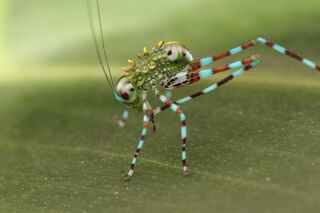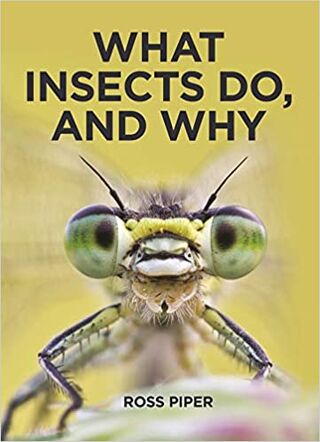Animal Behavior
The Mind-Boggling, Fascinating Behavior of Insects
A new book offers an unforgettable tour of the astonishing world of insects.
Posted August 10, 2021 Reviewed by Chloe Williams

Although I've spent many years studying various aspects of social behavior and the cognitive and emotional lives of mammals, especially carnivores, I am always intrigued—one might say fascinated and floored—by the astonishing diversity and complexity of behavior displayed by insects.
So, I'm thrilled that insect expert and explorer Ross Piper could take the time to answer a few questions about his magnificent new book, titled What Insects Do, and Why.1,2 Here's what he had to say about his latest beautifully illustrated and unforgettable tour of the world of insects.
Marc Bekoff: Why did you write What Insects Do, and Why?
Ross Piper: I want to get across just how fascinating the lives of insects are. Even people with an interest in nature often think of insects as just being food for larger animals. While this is true, it completely glosses over the astounding diversity of insect lives. Insects might be small, but they are anything but simple.

MB: How does your book relate to your background and general areas of interest?
RP: It might be cliché, but my interest in insects and animals is in general life-long. Some of my earliest memories are of finding insects in the garden of our family home. To the 4-year-old me, violet ground beetles and elephant hawk-moth caterpillars were utterly beguiling. This interest eventually led to a degree in zoology and a Ph.D. in ecological entomology. A good chunk of what I do now, be it, writing, presenting and teaching, involves sharing my enthusiasm for the remarkable diversity of animal life that surrounds us.
MB: Who is your intended audience?
RP: The book is for anyone with even a casual interest in nature, for anyone who’d like to know a bit more about how insects live.
MB: What are some of the topics you weave into your book and what are some of your major messages?
RP: The book is an introduction to how insects live. It starts off with describing what insects are, how they’re related to other animals and the key characteristics that have contributed to their success. From that starting point, it looks at how they live, using remarkable examples to explore how they reproduce, feed, defend themselves, exploit other species as parasites and parasitoids, live in complex societies and the complex mutualisms that have evolved between insects and other organisms.
The book concludes by looking at the ways in which human activities are causing insect declines, what we can do about this and the common questions I often get asked as an entomologist.
What I want people to take away from the book is that the lives of insects are often stranger than fiction and that evolution, as blind and directionless as it is, can generate some truly extraordinary ways of being. Hopefully, readers will think more deeply about insects and take more time to observe them. Get down on your belly in a meadow, your garden or a park and just take time to watch and the world becomes an infinitely more interesting place.
MB: How does your book differ from others that are concerned with some of the same general topics?
RP: A lot of stuff out there on insects is about identifying them for the purposes of biological recording, i.e. noting the presence of a species to understand more about its distribution. There’s relatively little in the way of accessible introductions to their lifestyles.
MB: Are you hopeful that things will change for the better as people connect with insects based on some of what you've written?
RP: If readers go on to observe insects more closely and even go on to make their own discoveries, this book will have been a success. Entomology is one of the most accessible sciences and there’s enormous scope for discovery. The lives of only relatively few insects have been studied in detail. Patience and observation is rewarded with insights into the secret lives of other beings.
MB: What are some of your current projects?
RP: When we’re not living in a global pandemic I try to go to the tropics as frequently as I can, either teaching or collecting species to find out more about the diversity of these animals. I’m also looking at the potential of insects as a source of novel pharmaceutical compounds. I also conduct surveys to try and protect habitats threatened by development and devise new ways to find and collect insects in different habitats.
MB: Is there anything else you'd like to tell readers?
RP: Get out there and take time to really observe these endlessly fascinating animals.
References
Bekoff, Marc. Flies: The Fascinating Lives of the Most Successful Insects.
_____. Wasps: The Astonishing Diversity of a Misunderstood Insect.
_____. Some Truths About the Fascinating Lives of Wasps.
Sebo, Jeff and Jason Schukraft. Don't farm bugs. Aeon, July 27, 2021.


